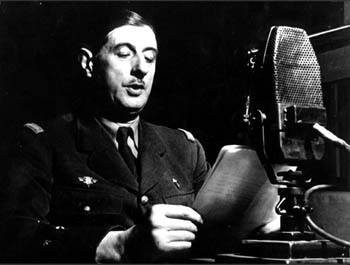The Resistance
May 1940: the German invasion began on the western front. France capitulated a few weeks later, crushed under the weight of the Nazi armored forces that penetrated and turned around many sectors of the front following grave strategical and political errors. The government in charge resigned at the arrival of the Nazis in Paris and a new government, presided over by Marshal Petain, was installed.
The armistice with Nazi Germany was signed June 22, 1940 and divided the French territory in two parts, occupied France to the north controlled by the Nazis and Vichy France to the south, formally independent like the colonies overseas, but in realty collaborative with the Reich.
The widespread discontent generated by this evil decision created the basis for one of the most important Resistance movements in Europe.

a propaganda poster of Free France
At the moment of the capitulation a part of the French armed forces was evacuating from the port of Dunquerque toward Great Britain along with the British expedition corps. Around General Charles De Gaulle soldiers and officials of the different armed forces concentrated themselves. They were opposed to the surrender and would constitute an important nucleus of Free France. These forces would participate in the liberation of France along with the Allied troops, giving an important contribution.
The citizens organized themselves autonomously in a galaxy of groups and organizations, which resisted the occupation and collaborated actively with the British (SOE) and American secret services (OSS). The activity of the French Resistance lasted from the beginning of the hostilities in June of 1940 up until the end of the war. The citizens united in the Resistance fought on French soil a bloody underground war made of sabotages, raids and reconnaissance, confronting the German army and the Vichy police, but above all with the most horrible part of the Third Reich: the Abwher, the Gestapo and the SS. These organizations made use of every terroristic means and did not recognize any rights of the prisoners, torturing them and carrying out retaliations against civilians.

General Charles De Gaulle
The French Resistance contributed to the preparation of Operation Overlord gathering ample and detailed information regarding the German units and fortifications, cooperating with numerous teams of French agents, English agents of the SOE and American agents of the OSS who had infiltrated the territory.
From the night of the first day of the invasion all of the partisan groups, who had remained for the most part in silence during the preceding weeks, activated themselves to hit objectives vital to the success of the invasion: telephone exchanges and lines, train connections, ammunition and means depots. As soon as possible the Resistance groups established contacts with the Allied units and cooperated as guides and vanguards.
Bit by bit that French soil was liberated, the partisan units increased in consistency and, along with the military units of the FFI (Forces Françaises de l’Intérieur) guided by General De Gaulle, fought against the Germans, representing the rebirth of the French Republic.